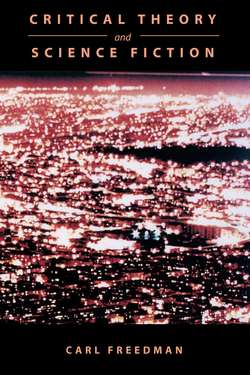Critical Theory and Science Fiction

Реклама. ООО «ЛитРес», ИНН: 7719571260.
Оглавление
Carl Freedman. Critical Theory and Science Fiction
Отрывок из книги
Critical Theory and Science Fiction
Carl Freedman
.....
Unless the distinction between cognition and cognition effect is kept steadily in view, the definition of science fiction as cognitive estrangement can lead to patent absurdities. For example, one of Asimov’s science-fiction mystery stories (“The Dying Night,” originally published in 1956) depends for its plot resolution on the assumption that Mercury has a “captured” rotation; that is, that it turns on its axis at precisely the same rate that it revolves around the sun, and therefore that it contains areas where night is permanent. This assumption was faithful to common astronomical wisdom at the time of the story’s composition, but was disproved in 1965; the planet, evidently, does rotate much more rapidly than it revolves, and all parts of it are at one time or another exposed to sunlight. In an afterword to one reprinting of the story, Asimov humorously complained, “I wish astronomers would get these things right to begin with,” and he refused “to change the story to suit their whims” (emphasis in original).21 Fortunately, the “whims” of astronomers have nothing to do with the cognition effect of the story (by an author, indeed, who is unusually consistent and insistent in producing the cognition effect), and there is no question of the story’s suddenly being reclassified as fantasy nine years after its initial appearance. Once the formal distinction is clear, however, between cognition and cognition effect, we should not exaggerate its practical significance: the readiest means of producing a cognition effect is precisely through cognition itself; that is, through rationality as the latter is understood from a critical point of view. Science fiction of Lewis’s or Lovecraft’s sort remains relatively atypical of the genre, while the solidity of the cognition effect in Russ or Asimov is by no means unrelated to the fact that Russ’s device may be cognitively legitimate, while Asimov’s once was. Science fiction is, overwhelmingly though not necessarily, a genuinely cognitive literature.
The second difficulty with defining science fiction as the literature of cognitive estrangement is rather more complex; it may be approached by noting that, taken literally, Suvin’s definition suffers from an immense sacrifice of descriptive to eulogistic force. It is one thing to transcend philology by expanding the concept of science fiction far beyond the largely forgettable pulp texts for which the term was originally invented, and even beyond the texts written in direct succession to pulp. But cognitive estrangement as a definitional principle seems not merely to transcend but to overturn both philology and common usage, largely denying the title of science fiction to most of the pulp tradition while granting it to works produced very far from the influence of the latter. I do not think it can be fruitfully maintained that many very complex or interesting cognitive estrangements are produced in Doc Smith’s Skylark series, or in the Star Wars films, or in most of that vast galaxy of television programs, films, stories, and novels designated Star Trek. Can we really accept a definition by the logic of which such work is not science fiction at all but the plays of Brecht—to take the obvious instance—are? It is true, of course, that for Brecht historical materialism is not only cognitive but scientific in the strongest sense, and Marx just as much the founder of a science as Galileo. Nor is there necessarily any reason (and here an old Kantian problem resurfaces) why the natural sciences should be cognitively privileged over the human sciences—even leaving aside that much of the science fiction that seems most explicitly wedded to the so-called hard sciences (for example, much of Heinlein) often turns out, upon inspection, to involve not science at all but engineering. Nonetheless, Suvin does, in fact, seem to find Brecht a difficult case: well aware of the latter’s status as the preeminent theorist and practitioner of literary estrangement (Verfremdung), he remarks that estrangement is “used by Brecht in a different way, within a still predominantly ‘realistic’ context” (Metamorphoses 7). The assertion is surely false, for Brecht is in no sense a literary realist, not even allowing for the quotation marks—as Lukács angrily charged and as Brecht himself proudly admitted.22 In order to clarify the issues at stake here, it is necessary to clarify the dynamics of genre criticism itself.23
.....